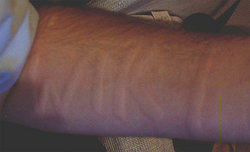The Question of Health postbag and e-mail box regularly fill up with readers' answers to the questions on this page. Some agree with my suggestions, but often they propose different answers. Keep your questions - and answers - coming.
LM comments on my suggestion that dermatographism could be treated with antihistamines:
I have suffered from chronic dermatographic urticaria myself. Several years ago I was given an "urticaria challenge" by a well- respected dermatologist at the Bristol Royal Infirmary. It was discovered I had reactions to yeast, mould and malt. A simple change of diet has meant a huge reduction in attacks, and being able to stop taking antihistamines. Taking them on a daily basis over the long term can have side-effects.
Please send your questions and suggestions to A Question of Health, `The Independent', Independent House, 191 Marsh Wall, London E14 9RS; fax 020-7005 2182; e-mail to health@in-dependent.co.uk. Dr Kavalier regrets that he is unable to respond personally to questions
Copyright 2002 Independent Newspapers UK Limited
Provided by ProQuest Information and Learning Company. All rights Reserved.



